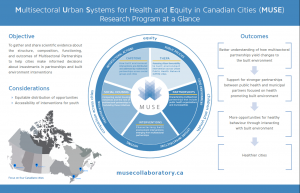Objective
The principal objective of the MUSE program is to gather and share scientific evidence about the structure composition, functioning, and outcomes of multisectoral partnerships (MPs) that are nurtured by public health organizations with municipalities to improve built environments related to transportation, leisure infrastructure, the food environment, and housing.
The MUSE team examines how these multisectoral partnerships (MPs) take equity into consideration, what added-value is available for children and youth, and how partnerships compare across four Canadian metropolises.
Research Questions
The MUSE Team’s program of research and knowledge sharing will address the following questions:
- Structure, composition, and functioning of MPs - What is the structure, composition, and functioning of the multisectoral partnerships (MPs) that are jointly established and nurtured by public health organizations and municipalities? How do these partnerships work to transform built environments related to transportation, leisure infrastructure, healthy eating, and housing?
- Activities, policies, and interventions emerging and implemented through MPs - What are the interventions (including activities and policies) emerging and implemented through these multisectoral partnerships (MPs)? What areas and populations are they aimed at? Are these interventions the result of the MPs or would they have occurred in the absence of the MP?
- Interventions’ targets and fundamentals - What are the targets of the interventions according to the intervention ladder (Nuffield Council on Bioethics)? What role does scientific evidence play in choosing interventions?
- Citizens’ acceptability of interventions proposed through MPs - To what extent are citizens favourable (or unfavourable) to interventions promoted through these MPs?
Cross-Cutting Issues
The MUSE program of research and knowledge sharing will examine the structure and functioning of multisectoral partnerships through the lense of the following three cross-cutting issues:
- Comparative Analysis - Comparative analyses will be performed to assess similarities and differences within and between cities (Montréal, Saskatoon, Toronto, Vancouver).
- Equity - Equity issues include any differences between sex, socioeconomic (including ethnocultural, immigrant, and Indigenous subgroups), and geographic subgroups.
- Children and youth - MUSE projects will focus on understanding what can be learned from various initiatives that hold promise for Canadian children and youth.
Multisectoral Partnerships
Multisectoral Partnerships (MPs) are social arrangements in which different organisations assemble and develop collaborative practices to achieve valued and shared goals.
Traditionally, MPs involve joint action taken by people working in various sectors (e.g., education, health, transportation) within public administration. More recently, the term has also included arrangements that involve various organizations through which resources are accessible such as the public sector (institutions), philanthropic societies, the private sector (businesses), and civil society (community organizations).
The term multisectoral refers to the idea that partnerships are comprised of multiple sectors. We aim to develop relevant knowledge and tools to ensure partnerships aiming at improving the health of populations living in urban areas can have the greatest impact.
